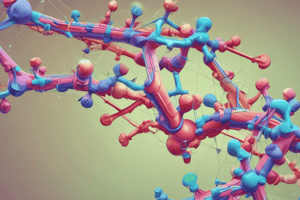Podcast
Questions and Answers
Pharmacodynamics is the study of what the body does to a drug.
Pharmacodynamics is the study of what the body does to a drug.
False (B)
Lead optimization aims to maintain or decrease favorable characteristics of a drug.
Lead optimization aims to maintain or decrease favorable characteristics of a drug.
False (B)
Pharmacokinetics involves the study of absorption, distribution, metabolism, and excretion of a drug.
Pharmacokinetics involves the study of absorption, distribution, metabolism, and excretion of a drug.
True (A)
Phase 1 Metabolism converts polar bonds to nonpolar bonds.
Phase 1 Metabolism converts polar bonds to nonpolar bonds.
The cytochrome P450 system is key in Phase 1 Metabolism.
The cytochrome P450 system is key in Phase 1 Metabolism.
The body transforms drugs into less polar structures for excretion in the urine.
The body transforms drugs into less polar structures for excretion in the urine.
Combinatorial chemistry allows for the preparation of a small number of compounds at one time.
Combinatorial chemistry allows for the preparation of a small number of compounds at one time.
Pharmaceutical companies typically store compounds in the refrigerator for easy access.
Pharmaceutical companies typically store compounds in the refrigerator for easy access.
Traditional drug discovery methods are highly rational and based on scientific principles.
Traditional drug discovery methods are highly rational and based on scientific principles.
Rational drug design involves designing drugs based on the structure of the target protein.
Rational drug design involves designing drugs based on the structure of the target protein.
Computer-assisted drug design is not related to rational drug design.
Computer-assisted drug design is not related to rational drug design.
In pharmacophore identification, small molecules need not be complementary in shape and charge to the biomolecular target.
In pharmacophore identification, small molecules need not be complementary in shape and charge to the biomolecular target.
Identifying the pharmacophore is essential to understanding which structural features are responsible for a lead compound's biological activity.
Identifying the pharmacophore is essential to understanding which structural features are responsible for a lead compound's biological activity.
Pharmacophore identification is not important in the drug discovery process.
Pharmacophore identification is not important in the drug discovery process.
Optimizing the structure to improve interactions with the target can lead to reduced toxicity and production costs.
Optimizing the structure to improve interactions with the target can lead to reduced toxicity and production costs.
Synthesizing analogs of the lead compound is not a common practice in drug discovery.
Synthesizing analogs of the lead compound is not a common practice in drug discovery.
Virtual screening is used in CADD to filter large compound libraries into sets of predicted active compounds that can be experimentally tested.
Virtual screening is used in CADD to filter large compound libraries into sets of predicted active compounds that can be experimentally tested.
In CADD, designing novel compounds is not one of the major purposes of the process.
In CADD, designing novel compounds is not one of the major purposes of the process.
Flashcards are hidden until you start studying
Study Notes
Drug Discovery and Development
- Drug discovery and development involve converting a lead compound to a more suitable drug by maintaining or augmenting favorable characteristics and abolishing drawbacks.
Lead Optimization
- Lead optimization involves improving pharmacodynamic and pharmacokinetic properties of a drug.
- This includes improving activity, reducing side effects, and enhancing pharmacokinetic properties.
Pharmacodynamics and Pharmacokinetics
- Pharmacodynamics is the study of what a drug does to the body.
- Pharmacokinetics is the study of what the body does to a drug.
- Pharmacokinetic properties include absorption, distribution, metabolism, and excretion (ADME) of a drug.
Metabolism of Drugs
- The body treats drugs as foreign substances, or xenobiotics, and tries to remove them by excretion in the urine.
- The kidney is set up to allow polar substances to escape in the urine, so the body tries to chemically transform the drugs into more polar structures.
- Phase 1 Metabolism involves the conversion of nonpolar bonds to more polar bonds, catalyzed by the cytochrome P450 system.
Traditional Drug Discovery
- Traditional drug discovery has disadvantages, including being irrational, based on serendipity and intuition, and being time-consuming with low output.
- It often involves a "Me Too Approach" with no de novo design.
Rational Drug Design
- Rational Drug Design is a process based on designing a drug upon the structure of its protein target.
- It starts with a validated biological target and ends up with a drug that optimally interacts with the target and triggers the desired biological action.
- It involves designing small molecules that are complementary in shape and charge to the biomolecular target.
Computer-Aided Drug Design (CADD)
- CADD is used for three major purposes: virtual screening, designing novel compounds, and guiding the optimization of lead compounds.
- CADD helps to filter large compound libraries, design novel compounds, and optimize lead compounds for affinity, metabolism, and pharmacokinetics properties.
Lead Compound Development
- Once a lead has been discovered, it is important to understand precisely which structural features are responsible for its biological activity.
- This involves identifying the "pharmacophore" - the structural features directly responsible for activity.
Pharmacophore
- The pharmacophore is the precise section of the molecule that is responsible for biological activity.
- Identifying the pharmacophore enables the preparation of a more active molecule by eliminating "excessive" functionality, thus reducing toxicity and cost of production.
Studying That Suits You
Use AI to generate personalized quizzes and flashcards to suit your learning preferences.




